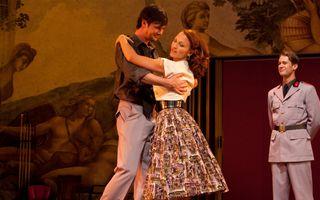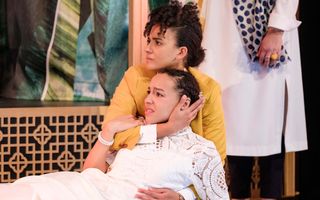BEATRICE
O God, that I were a man! I would eat his heart in the marketplace.
Act 4, Scene 2
Beatrice is the niece of Leonato, Hero’s cousin, and love interest of Benedick. Beatrice is one half of a pairing that is arguably Shakespeare’s greatest invention. Beatrice and Benedick appear nowhere in any of Shakespeare’s sources for this play, but they invariably steal the show in every production. Beatrice is forthright, cynical, and confident in a way that not only sets her apart from the other women in the play, but defies the expectations of how women were expected to behave at the time this play was written and set. One can only imagine that she would have been not only hilarious, but a thrilling example for young women standing in the pit at the Globe theatre, as she remains today on 21st century stages.
Through both Beatrice and Benedick, Shakespeare pokes fun at traditional ideas of romance and courtly love. Beatrice vows she will never marry and would rather hear her dog bark at a crow than a man swear his love, but she is neither cold nor invulnerable. Beatrice is kind, loving, tender, and articulate in a way that Benedick cannot match. Audiences are so endeared to Beatrice because of this complexity and contradiction that lie just beneath the surface. Shakespeare hints at a past relationship with Benedick which has obviously had a lasting effect on Beatrice:
You always end with a jade's trick: I know you of old.
Act 1, Scene 1
She loves her cousin, Hero, deeply and is protective of her. Beatrice’s joy for Hero’s newfound love, and her devastation and fury at the subsequent betrayal of Hero by Claudio, belie her cynicism.
Despite her protestations to the contrary, Beatrice is lured into the trick and believes Benedick to be in love with her, proving her openness to the concept of love.At the end of the play it seems she has finally made a happy match with Benedick.
However, we are not left under any illusions about the constraints that a woman like Beatrice must exist within. Ultimately it is through Beatrice’s apparent confidence and strength that Shakespeare focuses our attention on the lack of true agency women are afforded in the world of Much Ado About Nothing. When Hero is falsely accused at the altar, Beatrice’s voice is ignored and she is infuriated by her inability to defend her cousin’s honour:
O God, that I were a man! I would eat his heart in the market-place.
Act 4, Scene 2
BENEDICK
… But it is certain I
am loved of all ladies, only you excepted: and I
would I could find in my heart that I had not a hard
heart; for, truly, I love none.
Act 1, Scene 1
Benedick is a young lord from Padua and the love interest of Beatrice. He has been fighting under Don Pedro and is friend to him and Claudio. While his friends are interested in relationships and women, Benedick vows he will remain a bachelor for life.
Benedick and Beatrice have a long association with each other and enjoy exchanging witty, barbed comments in a “merry war” (Act 1, Scene 1). Benedick is the victim of a friendly trick to set him up with Beatrice. Despite their earlier purported disdain for one another, the two eventually admit their true feelings and agree to marry.
Benedick sits somewhat apart from the other male soldier characters in the play, and distances himself from Claudio and Don Pedro after their cruel treatment of Hero. He voices a moral compass that the Claudio and Don Pedro appear to lack. He challenges Claudio on insistence from Beatrice, proving his change of allegiance, and accuses him directly of his ill-treatment of Hero:
You are a villain; I jest not:
I will make it good how you dare, with what you
dare, and when you dare. Do me right, or I will
protest your cowardice. You have killed a sweet
lady, and her death shall fall heavy on you.
Act 5, Scene 1
Benedick’s transformation from anti-marriage to a devoted lover is complete by the end of the play. From his initial exasperation at Claudio’s love:
Shall I never see a bachelor of three-score again?
Act 1, Scene 1
To his final advice to Don Pedro:
Prince,
thou art sad; get thee a wife, get thee a wife...
Act 5, Scene 4
DON PEDRO
I shall see thee, ere I die, look pale with love.
Act 1, Scene 1
Don Pedro is a nobleman from Aragon. He is the character with the highest social and political stature in the play, and is an old friend of Leonato, Governor of Messina. Don Pedro is close with his soldiers Benedick and Claudio, and although their senior, appears to be a genuine friend to them. Although Don Pedro is generally good-natured and generous to his friends, like Leonato he is quick to make negative judgements of others and to take revenge.
He is a key player in the trick to lure Benedick and Beatrice together, and believes Hero to be disloyal to Claudio without any hesitation. Don Pedro does not have any romantic interests in the play, seemingly outside of the circle of marriage and relationships. At the end of the play, Benedick says to him “Prince, thou art sad. Get thee a wife...” (Act 5, Scene 4).
LEONATO
By my troth, niece, thou wilt never get thee a
husband, if thou be so shrewd of thy tongue.
Act 2, Scene 1
Leonato is the respected and wealthy Governor of Messina, father of Hero, and uncle of Beatrice. He is second only in the play’s social structure to Don Pedro. He has a great desire to see Hero and Beatrice married and takes part in the trickery to match Beatrice with Benedick. Despite his good intentions, Leonato is easily swayed by Don John’s deceptive plan and initially distrusts his own daughter’s innocence. Once he learns the truth, Leonato is enraged by the plot to destroy Hero’s honour and happiness, though still allows Claudio to marry his daughter.
CLAUDIO
Can the world buy such a jewel?
Act 1, Scene 1
Claudio is a young lord from Florence, and Hero’s love interest. He has been fighting with Benedick in the service of Don Pedro. Claudio is a Count and is of a higher social stature than Benedick, though lower than Don Pedro. He is Hero’s love interest, immature, and easily deceived.
On Claudio’s return to Messina he falls instantly in love with Hero and makes plans to marry her within days. Despite being besotted with Hero, he is quickly drawn in by Don John’s trick to prove her supposed unfaithfulness. He believes the lie about his bride-to-be, and waits until the wedding ceremony to accuse her publicly and cruelly. He is unapologetic of his behaviour, believing he has been personally wronged, even when told that Hero has supposedly died.
When Claudio finds out that he has falsely accused Hero, he agrees to mourn her and marry Hero’s ‘cousin’ in her place. When this new bride is revealed to be Hero, alive and well, Claudio’s previous, poor behaviour is seemingly forgiven very quickly. His final act is to share love letters written by Benedick to prove that he in fact does love Beatrice.
HERO
Is it not Hero? Who can blot that name
With any just reproach?
Act 4, Scene 1
Hero is the young daughter of Leonato and the cousin of Beatrice. Her beauty and grace is often referred to and much admired. In comparison to Beatrice’s fiery temperament, Hero is gentle, quiet and reserved. She has lived a sheltered life and does not have much agency of her own. In fact, despite being a major character in the play, Hero has very few lines.
Hero is an excited participant in the trick to lure Beatrice and Benedick together. She falls in love with Claudio quickly, and the two agree to marry within the week. However, Hero is a poor victim in Don John’s wicked plan to slander her and question her loyalty and chastity. Hero is shocked by the accusations and asserts her innocence, collapsing in the midst of events. She agrees to the plan to her faked death, and appears to forgive Claudio, agreeing to marry him once more at the conclusion of the play.
DON JOHN
… If I had my
mouth, I would bite; if I had my liberty, I would do
my liking: in the meantime let me be that I am and
seek not to alter me.
Act 1, Scene 3
Don John is the brother of Don Pedro and one of the villains of the play. Because he is the illegitimate brother of Don Pedro, he is often called often called the ‘bastard brother’. Don John is a melancholy character and appears to despise happiness in others. He is quick to construct the plot to destroy Hero and Claudio’s happiness. His actions in the play are motivated by his jealousy and resentment of his brother, Don Pedro, who defeated him in battle and keeps him on a tight leash. While some characters sit somewhat apart from the action, Don John appears to be the most removed. In a story that wildly circles around love and match-making, Don John is sullen, bitter and determined to ruin the chances of happiness for others. He admits that he is a “plain-dealing villain” (Act 1, Scene 3) and does not apologise for this. After Don John’s plot is discovered, he is captured and awaits punishment.
DOGBERRY
Dost thou not suspect my place? dost thou not
suspect my years? O that he were here to write me
down an ass!
Act 4, Scene 2
Dogberry is the head constable of Messina in charge of the Watch. He takes his job and position very seriously, however Dogberry is often seen as the clown of the play. Dogberry frequently speaks in malapropisms, where one word is mistakenly used instead of another, to amusing effect. This stems from his desire to speak formally like the noblemen of Leonato’s house, even though he is of a lower social stature. In fact, he is so ineffectual at communication that when he tries to tell Leonato of the news of the plot against his daughter, Leonato dismisses him in frustration. Despite his incompetence, Dogberry does eventually communicate to Leonato the news of the plot and his capture of Borachio and Conrade, ensuring the play ends with a positive resolution.
ANTONIO
If you go on thus, you will kill yourself:
And 'tis not wisdom thus to second grief
Against yourself.
Act 5, Scene 1
Antonio is the brother of Leonato and uncle to Hero and Beatrice. He is fiercely loyal to his family and nieces, defending Hero’s honour passionately. He is also a strong support for his brother, Leonato, and urges him to not surrender to grief following the events where Hero is slandered. Antonio is very outspoken about the cruel behaviour of the young men in the play:
Scrambling, out-facing, fashion-monging boys,
That lie and cog and flout, deprave and slander,
Go anticly, show outward hideousness,
And speak off half a dozen dangerous words,
How they might hurt their enemies, if they durst;
And this is all.
Act 5, Scene 1
MARGARET
Give us the swords; we have bucklers of our own.
Act 5, Scene 2
Margaret is Hero’s serving-woman and the lover of Borachio. She unwittingly becomes part of the plot to deceive Claudio into thinking Hero is unfaithful. Margaret, like Beatrice, has a quick wit.
URSULA
She's limed, I warrant you: we have caught her, madam.
Act 3, Scene 1
Ursula also attends Hero, and is also involved in the trick to lure Beatrice and Benedick together.
BORACHIO
The poison of that lies in you to temper.
Act 2, Scene 2
Borachio is a follower of Don John and another villain of the play. He concocts the scheme to deceive Claudio into thinking Hero is unfaithful, and uses his lover, Margaret, as part of the plan.
CONRADE
… it is needful
that you frame the season for your own harvest.
Act 1, Scene 3
Conrade is a close follower of Don John and is a keen conspirator in his evil plans.
FRIAR FRANCIS
Did I not tell you she was innocent?
Act 5, Scene 4
Friar Francis is a holy man and religious adviser to Leonato. He is able to conduct weddings and does so for Hero and Claudio, and Beatrice and Benedick, at the end of the play. He comes up with the plan to revive Hero’s reputation.
VERGES
… I thank God I am as honest as any man living
that is an old man and no honester than I.
Act 3, Scene 5
Verges is the town ‘headborough’ (a parish officer) and deputy to Dogberry. He is often referred to as being an old man, and is a comic sidekick to Dogberry’s well-meaning incompetence.





